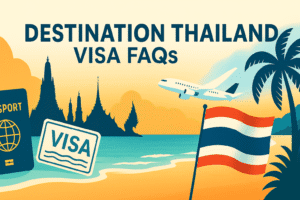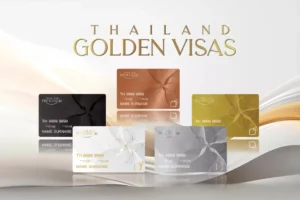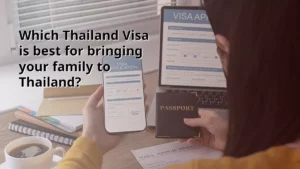Thailand has long been one of the most popular retirement destinations for retirees all around the world, offering quality healthcare, a reasonable cost of living, safety, and accessibility to some of the most beautiful natural landscapes.
Considering the cultural and language differences, as well as making decisions, navigating the legal aspects of your retirement can be a challenge in Thailand.
Whether you’re planning to spend the retirement years with your non-Thai partner or Thai partner, Thailand has various visa options that allow you to truly settle in, and enjoy your new life for an extended period of time.
In this article, we will guide you through every step to help you understand the Thai retirement visa for you and your partner and the eligibility criteria for you to make the most of your time in Thailand.
Understanding the Thai Retirement Visa
The Thai retirement visa or the non-immigrant OA visa is a long-term visa allowing the holder to stay in the kingdom for one year. The visa is renewable every year and can be done in Thailand.
Married non-Thai couples looking to retire in Thailand who are both 50 years or older are eligible for the Thai retirement visa. However, the pair will be treated as individual applicants and will have to meet the financial requirements independently.
If your partner has not reached the age of 50, he/she can act as your dependent.
Eligibility Criteria for the Retirement Visa
- Both non-Thai national applicants must be 50 years or older.
- Must meet the following financial requirements:
- Have at least an 800,000 THB deposit for at least two months before the visa application.
- A monthly income of at least 65,000 THB.
- A combination of security deposit and annual income of a total of 800,000 THB.
- Non-immigrant type “O-A” visas are required to have a health insurance policy with a minimum coverage of 100,000 USD, including treatment for COVID-19.
Supporting Documents
- In case of demonstrating security deposit, applicants will have to provide an updated bank book and a letter from the bank certifying that the money had been deposited from an overseas account at least two months before the visa application date.
- If applicants wish to demonstrate their monthly income, a letter certifying their income from your embassy in Thailand is required. If the embassy does not issue the following letter, applicants are required to provide a 12-month statement showing a regular deposit of at least 65,000 THB every month into a Thai bank account.
Application Process
- Non-Immigrant OA Visa Application in Your Home Country:
- Not all Thai embassies or consulates can provide you with this visa.
- The supporting documents as mentioned above have to be presented to the consulate in your home country or Thai embassy.
- The applicants are required to provide a medical certificate, police clearance, and annual health insurance.
- Entering Thailand as a tourist and Applying for the Non-Immigrant O Visa and Extension:
- Foreign nationals on a tourist visa or visa exemption stamp are eligible for the retirement visa given that the applicant has already met the requirements for a non-immigrant O visa application and 1-year visa extension application.
- This can be done at Thailand immigration offices.
- Non-immigrant O visa and Extension in Thailand applications:
- Applicants are required to apply for a 90-day initial non-immigrant visa from the consulate in their country of residence or the Thai embassy before they apply for a retirement visa.
- Before applying for a retirement visa at the immigration office, you must be in Thailand for 60 days, or you must be within the final 30 days of a current permit.
- Proof of address in Thailand is required (i.e. rental agreement, utility bills, etc.)
Retiring in Thailand with a Non-Thai Partner Below 50 Years
Non-Thai spouses below the age of 50 are not eligible for the Thai retirement visa. However, if the person is married to the retiree who holds a valid retirement visa, the spouse is eligible for the Thailand dependent visa.
The dependent visa allows the applicant to stay in the kingdom for up to 1 year and the same visa can be renewed the next year, given that the retiree’s (the supporting spouse) visa status is valid.
Dependent’s Eligibility
- Proof of relationship with the main visa holder is required to demonstrate to the Thai immigration.
- The main visa holder should be able to demonstrate his/her ability to provide and support the dependent.
- A minimum of 6 months passport validity.
Application Process
- The applicant can start applying for being dependent on a person who has residency in Thailand (Non-o) at Thai embassies and consulates in their home country.
- After being approved, the applicant can enter the Kingdom as a dependent of the main visa holder.
- The validity of the Non-o visa is 90 days. If the dependent wishes to continue his/her stay in the kingdom, an extension can be done 30 days before the expiration date.
Note: The divorce between the dependent and the supporter will result in the dependent’s visa being canceled. The dependent would have to leave the kingdom as soon as possible.
Retiring in Thailand with a Thai Partner
If the retiree has a Thai national partner, the retiree can choose to opt for the marriage visa instead as there is a lower requirement.
Retiring in Thailand can be a dream come true for retiring couples. It is crucial to understand the visa options as any mistake may result in the application being unsuccessful. It is advisable to consult with the Thai embassies, consulates, immigration offices, and experienced visa agents to ensure a smooth transition.
If you have questions about the Thai Retirement Visa or planning to reside in Thailand long-term, reach out to us for a consultation.
For inquiries about the Thai Long-term Resident Visa Application, please use this form to contact us.








































